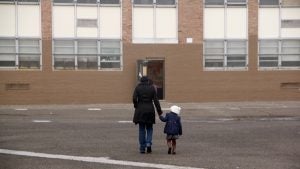Part Two: The Critic
Listen 6:48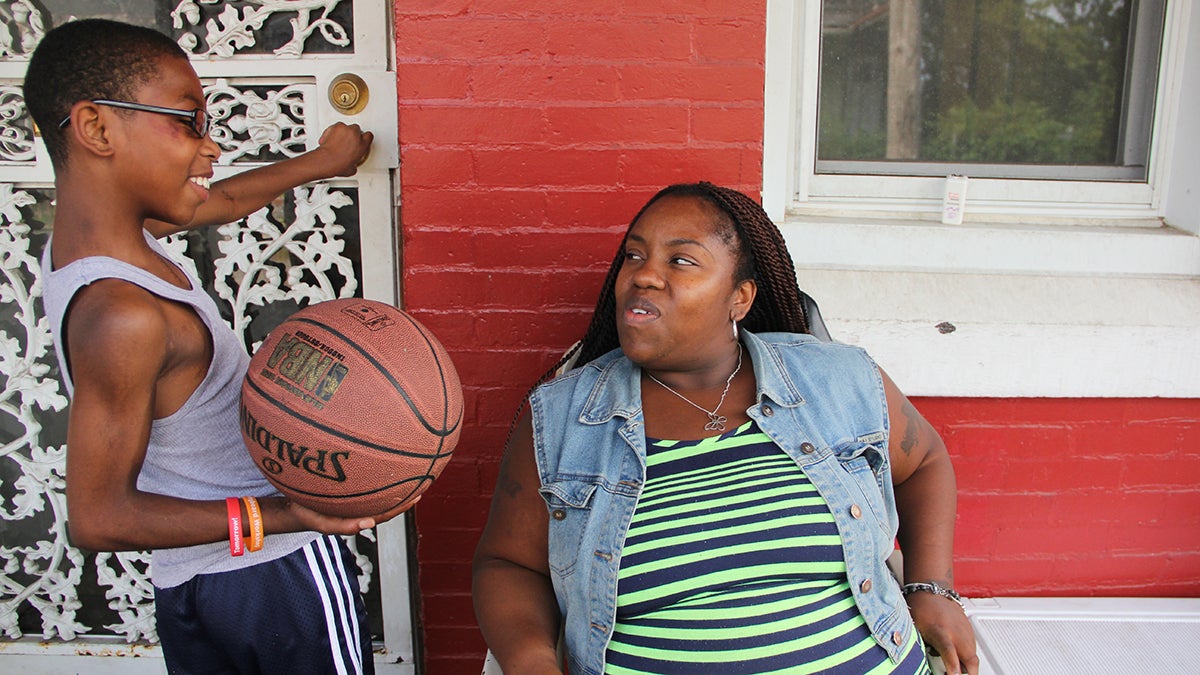
Rosalinda Harris worries that her son's medical needs aren't being met at Blaine Elementary. Her son,Chance Nelson,11, was born with a heart defect. (Emma Lee/WHYY)
A mother worries that the faculty’s dedication and hard work just won’t be enough to keep her medically fragile son safe. That would take more staff.
Blaine Elementary’s turnaround attempt is one of two that were unveiled by the Philadelphia School District last year. Kelley Elementary School, just a few blocks away from Blaine in the Strawberry Mansion section of the city, was the other.
Both stand in stark relief to the district’s previous turnaround model, which labelled some schools “Promise Academies.”
That model, introduced by previous superintendent, Arlene Ackerman, was much more of a top-down, cookie-cutter approach.
In the first year of Promise Academies, extra funding flowed to these schools, but soon recessionary budget cuts stripped away the added supports, and it has been widely acknowledged that the “promise” was broken.
Much of Andrew Brooking’s anxiety about Blaine comes from his distrust of the school district bureaucracy.
He spent his first few years as a teacher in Roberto Clemente elementary, a North Philadelphia Promise Academy, and felt that, systemically, that turnaround model did little to positively impact kids lives.
“It’s hard to find a place that you believe in and that you think is going to work,” he said. “My problem has been putting hard work into something that isn’t worth it.”
Blaine and Kelley represent a new direction for the district. The principals have been given autonomy to recreate schools as they see fit. Staff have come together to create something from the bottom up, and the central office largely stays out of the way.
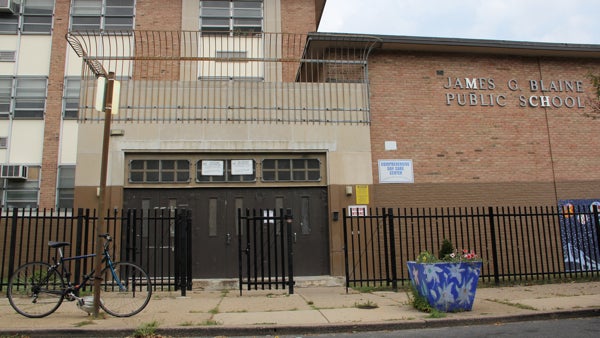
Blaine Principal Gianeen Powell offered us incredible access to the school to report this story.
She OK’d every request without hesitation. She was giving of her own time and willing to share her hopes and frustrations and details of her personal life. Interviews with other staffers were allowed freely, as were interviews with parents in the school yard.
For many schools — perhaps especially Philadelphia neighborhood schools — this can be a frightening prospect. The easiest, safest course of action for principals is to refuse all requests and deflect inquiry to central administration.
Powell’s course gave a much more comprehensive view of Blaine, scars and all.
Towards the end of the year, NewsWorks sat in on a parent meeting held at the school that gave a stark view of some of those scars.
There was supposed to be a presentation given by the Red Cross, but when the organization backed out at the last minute, the meeting devolved into a complaint session. Mothers and grandmothers talked over each other as Cynthia Jones, the community outreach coordinator, took notes and tried to address concerns.
Parents were either upset about the shortage of support staffers in hallways and the lunchroom, or about how an individual academic or behavioral infraction was handled with their child.
In an interview after the meeting, parent Roslinda Harris fumed.
“It’s a cover up. It looks cute on the outside, but what’s going on on the inside?” she asked. “Only thing I see changed is a little bit of paint on the walls and some uniforms.”
Attending this meeting proved important to understanding the context of the work being done at Blaine, as it led us to two different guardians with wildly different takes on the turnaround effort.
One extremely critical of the status quo, another greatly encouraged and hopeful for the future.
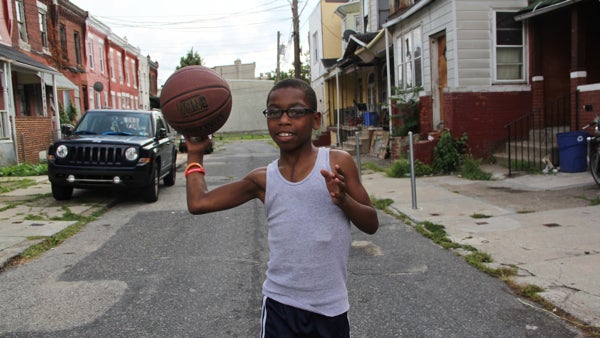
Roslinda Harris is the former. Her son, Chance Nelson, was born with half of a heart.
“I had heart surgery, when I was a baby,” said Chance, in an interview on the porch of his home.
Chance is 11 now, and will go into fifth grade in the fall. Based on his condition, he’s small for his age, looking more like 8 or 9.
Harris was to have twins, but learned of severe complications during pregnancy. Chance’s brother died during labor. Chance survived, but needed open-heart surgery immediately. Doctors at the Children’s Hospital of Philadelphia warned that he could be paralyzed for the rest of his life.
Roslinda raised Chance alone. His biological father, who Chance has never met, is serving time in a federal prison. The stepfather who helped raise him was shot and killed as a victim of a robbery in 2013, the same year Roslinda had a career-debilitating stroke.
Chance has defied expectations, but he’s needed critical medical attention many times throughout his life.
And now, as an elementary school student, although at first glance he looks like any other healthy child, he’s extremely fragile.
“I’m trying to make them aware. He has a feeding tube on his stomach. What are the signs to look for if he can’t breathe, stuff like that — how important it is not to make him walk up the steps. It’s okay to come down, but don’t stress the heart more than what it needs to do,” said Harris.
“If he’s mishandled, it becomes a fatal issue, and half of the staff didn’t even know his issue.”
Chance isn’t supposed to participate in physical sports and can’t run around with his classmates during recess or lunch. Instead he stays in a classroom with a staff member.
But all doesn’t always go as planned, and Harris questions whether the school can fulfill her son’s individualized education plan (IEP).
“He comes home from school and tells me he was playing football, with a long scrape up his arm,” said Harris. “I don’t get no phone call. He’s on blood thinners. They couldn’t stop the bleeding. Of course. He’s on blood thinners. This is why an IEP has been put in place to tell you he’s not allowed for physical contact sports.”
Most of Harris’ complaints about the school aren’t aimed at Principal Powell or any of the staffers. She understands the limited nature of the resources, and appreciates the attempt at turnaround, but it’s hard for her to be optimistic when the school still lacks basic supports.
“So imagine if I were to send him there with medication. Do you think I’d be with them giving him his medicine?” she asked. “No, because ya’ll don’t have a nursing staff everyday of the week like you used to have.”
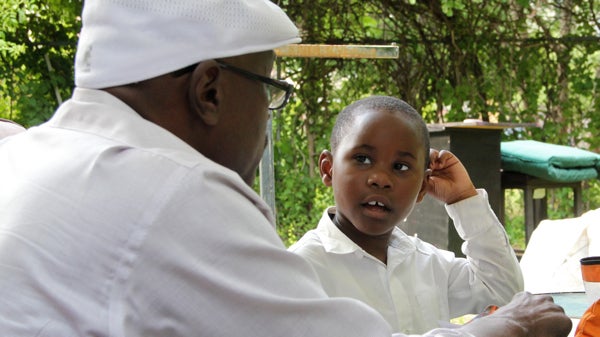
“If you’re not safe, how can you learn? That’s the whole thing in a nutshell.”
It’s impossible to talk about Blaine without acknowledging the systemic inequities of Pennsylvania’s education funding model. The U.S. Department of Education has flagged it as the most inequitable in the nation, and analysis reveals that state aid is biased against districts serving sizable minority populations, no matter their local wealth.
The state also has the distinction of being one of only three states without a predictable formula to drive out state education aid.
In other states, Blaine would receive more funding based on its population of high-poverty, high-need students. In Pennsylvania, those factors don’t come into account.
There is a bipartisan drive to implement a fairer formula. But there continues to be a deep divide between first-year Democratic governor Tom Wolf and the Republican-held legislature over Wolf’s proposal to drastically increase education spending.
Roslinda Harris has witnessed first-hand how Pennsylvania’s systemic inequities trickle down into real consequences for an under-resourced school like Blaine. Last year, Chance was frequently bullied in the stairwells and, one day, attacked by a group of students in the bathroom.
“There’s not enough staff in the hallways, bathrooms, cafeteria, none of that, to support these kids as far as being safe,” Harris said. “If you’re not safe, how can you learn? That’s the whole thing in a nutshell.”
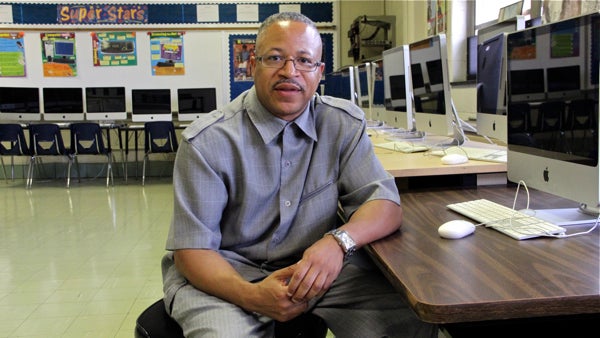
Despite the obvious resource deficiencies, many in the Blaine community readily acknowledge that additional school funding will not heal all wounds.
Teacher Rasheed Abdullah has been at Blaine longer than anybody, mostly as a math teacher. Now he teaches computer science, where he interacts with kids in every grade, K through eight.
“You see early pregnancies. You see children getting caught up in the judicial system,” he said. “It bothers me when I see children grow up and get caught up by the environment, and the environment takes these wonderful, bright-eyed children and leads them down the wrong path.”
Abdullah grew up in Strawberry Mansion and followed in his father’s footsteps as a Philly public school teacher. In two decades at Blaine, he’s become a father figure — one who kids respect and to whom kids flock.
The elephant in the room, he says, is that, for many reasons, many parents don’t have the ability, wherewithal, or means to instill positive social values into their own children.
“We need to re-teach children what being a man is, what being a woman is, because over the years I think we’re losing that,” he said. “You know, and I try to tell them that manhood is not just taking care of your family, or supporting your family, but also taking care of your community.”
From Principal Powell’s perspective, interacting with parents can be a precarious tightrope walk — especially when higher school expectations mean holding children to a higher bar.
“They just want the best, so sometimes they don’t want to hear negative things that are happening, and how we can address them to make them change and make them think differently,” she said.
Part of Powell’s job is to gain parents’ trust and convince them that, as a community of educators, the school has the best interests of their kids at heart.
“We just don’t want our parents to hinder their growth,” said Powell, “so it’s all about education and the philosophy on making them grow.”
This can be especially challenging given that many of the parents are in their late teens or early 20s themselves — a point Roslinda Harris harps on.
“You got to look at the ratio. It’s kids having kids,” Harris said. “So you can’t expect no more than what the heck you’re getting in the neighborhood that we live in. They just get up in the morning, come in here with their pajamas on, drop their kids off. This is a daycare.”
Another point Harris says can’t be ignored is the fact that some of the parents are the very criminal element that drives unrest in the community.
“Some of these kids, they think their mom and dad are the baddest people to ever walk the earth,” she said. “So they come in the school and be bullies.”
With these realities in mind, while Abdullah admires the turnaround attempt, he doesn’t believe it will amount to much without doubling down on holistic, “whole child” instruction that puts ethics and character development at the center — a radical idea in the era of high-stakes standardized tests.
“There’s more focus on math and reading, because that’s what’s really tested,” said Abdullah, “but at the expense of what?”
WHYY is your source for fact-based, in-depth journalism and information. As a nonprofit organization, we rely on financial support from readers like you. Please give today.



